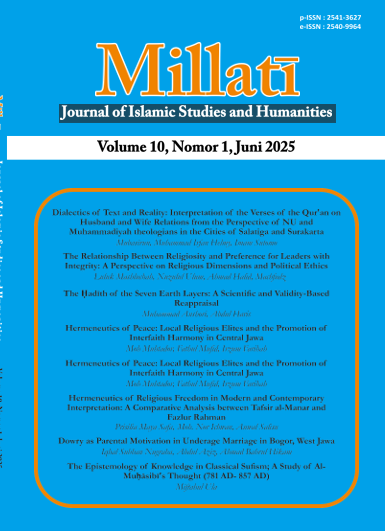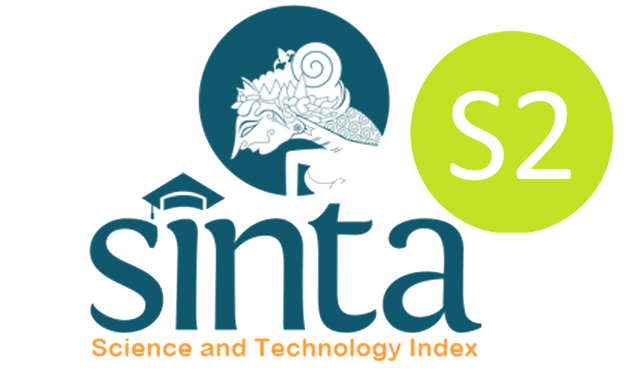The Relationship Between Religiosity and Preference for Leaders with Integrity: A Perspective on Religious Dimensions and Political Ethics
DOI:
https://doi.org/10.18326/millati.v10i1.3818Keywords:
Political Ethics, Leadership Preference, Integrity, Voter Behavior, ReligiosityAbstract
This study aims to analyze the relationship between religiosity and the preference for leaders with integrity, as well as examine the role of political ethics as a moderator in this relationship. Using a quantitative approach with a descriptive and correlational design, this research involved 185 respondents selected through purposive sampling. Data were collected using a Likert-scale-based questionnaire and analyzed using Moderated Regression Analysis (MRA). The findings indicate that religiosity has a positive relationship with the preference for leaders with integrity; however, this relationship is strengthened by an individual's level of political ethics. Individuals with high political ethics are more consistent in selecting leaders based on integrity, whereas those with low political ethics are more influenced by external factors such as political affiliation, social pressure, and economic conditions. Additionally, this study identifies that party loyalty, socioeconomic background, media influence, and social norms can either strengthen or weaken the relationship between religiosity and integrity-based leadership preferences. These findings reaffirm that religiosity is not the sole determining factor in voter decision-making; rather, it must be understood within the context of political ethics and other external influences. The implications of this research highlight the necessity of political education based on ethical values and integrity to cultivate more critical and rational voters in selecting leaders with integrity.
References
Anggraeni, Leni, E. Hasbi Nassaruddin, and Dewi Mayaningsih. 2024. “The Influence Of Religion And Community Behavior On Election Success In West Java In 2019.” Varia Hukum: Jurnal Forum Studi Hukum Dan Kemasyarakatan 6(1). doi: 10.15575/vh.v6i1.35231.
Bagis, Fatmah, Akhmad Darmawan, Farah Kusuma, Aprilia Nurrahma, and Mela Azizah. 2023. “Descriptive Quantitative Analysis to Measure the Level of Religiosity of Students at the University.” ICONESS. doi: 10.4108/eai.22-7-2023.2335422.
Creswell, John W. 2019. Educational Research: Planning, Conducting, and Evaluating Quantitative and Qualitative Research. Vol. 11. FOURTH EDI. Pearson.
Crismono, Prima C. 2018. “Pengaruh Possing Problem Berkelompok Terhadap Hasil Belajar Matematika Siswa.” Al-Ashr: Jurnal Pendidikan Dan Pembelajaran Dasar 3(1):45–53.
Crismono, Prima Cristi. 2023. Statistik Pendidikan: Untuk Penelitian Dengan Pendekatan Kuantitatif Baik Parametric Maupun Nonparametrik Dan Dilengkapi Dengan Penggunaan SPSS. Jember: UIJ Kyai Mojo.
Crismono, Prima Cristi. 2024. Metode Penelitian Pendidikan : Pendekatan Kuantitatif, Kualitatif, Ptk, Dan Penelitian Pengembangan. edited by F. Hanifiyah and I. Erdiansyah. Bondowoso: KHD Production.
Crismono, Prima Cristi, Saman Hudi, Elga Yanuardianto, and Muhammad Ilyas. 2025. “Research Trends in Islamic-Based Mathematics Education : Global Studies and Academic Collaboration Networks.” International Journal of Current Science Research and Review 08(03):1091–1105. doi: 10.47191/ijcsrr/V8-i3-12.
Datta, Ajoy, Harry Jones, Vita Febriany, Dan Harris, Rika Kumala Dewi, Leni Wild, and John Young. 2011. The Political Economy of Policy-Making in Indonesia: Opportunities for Improving the Demand for and Use of Knowledge.
Driskell, Robyn, Elizabeth Embry, and Larry Lyon. 2008. “Faith and Politics: The Influence of Religious Beliefs on Political Participation.” Social Science Quarterly 89:294–314. doi: 10.1111/j.1540-6237.2008.00533.x.
Elsayed, Konstantina Giorgos, Arabatzi Amyras Lestari, and Fotini Adamou Brougham. 2023. “Role of Religion in Shaping Ethical and Moral Values Among the Youths in Athens, Greece.” Journal of Sociology, Psychology & Religious Studies 5(1):11–20. doi: 10.53819/81018102t5153.
Fadhlurrohman, Muhammad Iqbal, Tengku Imam Syarifuddin, and Etika Khairina. 2021. “Political Ethics in Leadership: Impact of Behaviour Ethics Implementation of Regional Heads in Indonesia.” Journal of Government and Political Issues 1(1):45–55. doi: 10.53341/jgpi.v1i1.10.
Gea, Antonius. 2016. “Personal Integrity and Leadership.” Humaniora 7(3):359. doi: 10.21512/humaniora.v7i3.3590.
Habiby, W. N. 2017. Statistika Pendidikan. Muhammadiyah University Press.
Khair, Otti Ilham, and Wirman Syafri. 2023. “The Role of Ethics in Decision Making by the Constitutional Court on the Age Limit for Presidential and Vice Presidential Candidates.” Aristo 12(1):297–313. doi: 10.24269/ars.v12i1.8189.
Martiny, Alice, Jonathan Taglialatela, Francesco Testa, and Fabio Iraldo. 2024. “Determinants of Environmental Social and Governance (ESG) Performance: A Systematic Literature Review.” Journal of Cleaner Production 456(April):142213. doi: 10.1016/j.jclepro.2024.142213.
Novitasari, Dewiana, Masduki Asbari, Laksmi Wijayanti, Choi Chi Hyun, and Moh Farhan. 2021. “The Role of Religiosity, Leadership Style, Job Satisfaction and Organizational Citizenship Behavior Mediation on Woman Teachers’ Performance.” Solid State Technology 63:2953–67.
Palanski, Michael, and Francis Yammarino. 2007. “Integrity and Leadership:: Clearing the Conceptual Confusion.” European Management Journal 25:171–84. doi: 10.1016/j.emj.2007.04.006.
Roziqin, Ali. 2025. “Research Theme Mapping and Future Directions on Corruption and Religion : A Bibliometric Analysis.” (March). doi: 10.3389/fsoc.2025.1502700.
Suseno, Andi, Utik Bidayati, and Mahamadaree Waeno. 2024. “Intrinsic Religiosity and Purchase Intention : The Role of Attitude and Moral Efficacy.” Jurnal Fokus Manajemen Bisnis 14(2):227–40.
Tullah, Rosna Andini Rachma, Prima Cristi Crismono, and Muhammad Ilyas. 2023. “Hubungan Keberadaan Kedua Orang Tua Di Rumah Bersama Siswa Terhadap Motivasi Belajar Dan Prestasi Akademik.” Jurnal Consulenza : Jurnal Bimbingan Konseling Dan Psikologi 6(2):269–85. doi: 10.56013/jcbkp.v6i2.2390.
Zarghamifard, Mojgan, and Hassan Danaeefard. 2020. “What Drives Leader Integrity.” International Journal of Business Governance and Ethics 14:1. doi: 10.1504/IJBGE.2020.104685.
Downloads
Published
How to Cite
Issue
Section
License
Copyright (c) 2025 Luluk Mashluchah, Nuzulul Ulum, Ahmad Halid, Machfudz

This work is licensed under a Creative Commons Attribution-ShareAlike 4.0 International License.







